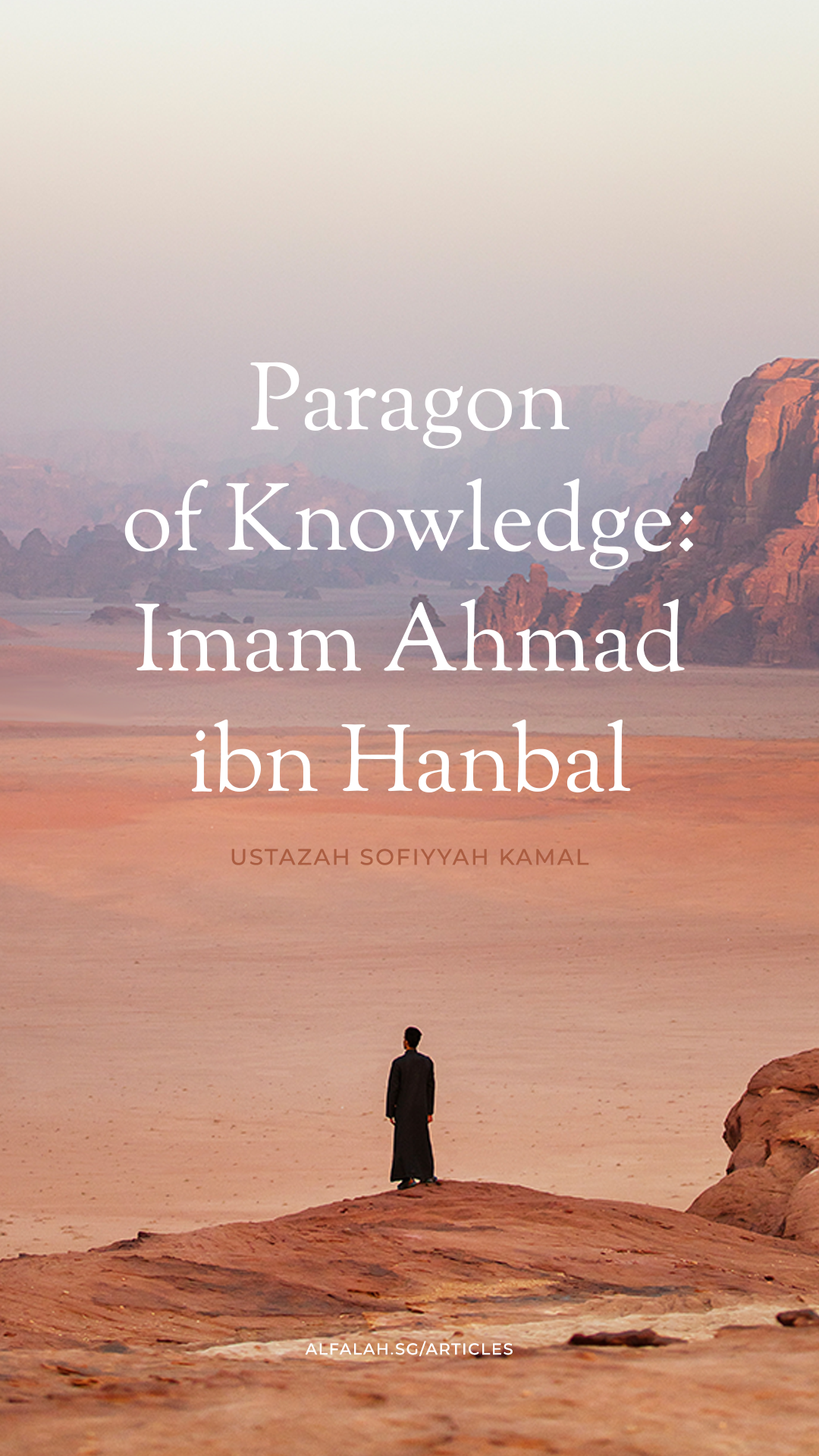Articles
Paragon of Knowledge: Imam Ahmad Bin Hanbal
- BY Ustazah Sofiyyah Kamal
- ON
- scholars, knowledge, spirituality, faith

Among the paragons of the 2nd century, after the Prophet’s (ﷺ) passing in 164H, there was nary a figure quite like Imam Ahmad Ibn Hanbal. Sharing a common ancestor with the Prophet Muhammad (ﷺ), Imam Ahmad too endured a life full of challenges and hardships, as most of our pious predecessors do in Islam.
As the prophetic saying narrated by Anas r.a goes:
“It was reported from the Prophet (ﷺ) who said: “Indeed greater reward comes with greater trial. And indeed, when Allah loves a people, He subjects them to trials, so whoever is content, then for him is pleasure, and whoever is discontent, then for him is wrath.”
Background
Ahmad Ibn Muhammad Ibn Hanbal Ash-Shaybani, also known as Imam Ahmad Ibn Hanbal, lost his father at a very young age and was brought up by his mother. Since young, he was already well-known for his outstanding character, which upheld high moral values. He was a scribe who refused to pen anything objectionable, and thus, he stood out among his peers due to the virtues attributed to him. He was also known as a clean man, meticulous in his dressing and thinking, and inspired awe in the people who were privileged to be in his presence.
Sincere love for knowledge
Imam Ahmad’s love for knowledge, especially that of hadeeth, blossomed in his tender years. From the earliest years of his youth, he resolved to travel to many regions, such as Iraq, Ash-Sham, Al-Hijaz, and Al-Kufah, to obtain knowledge from all the scholars from the different regions. His most famous book, the Musnad, testifies to this endeavour of his.
Imam Ahmad endured hardship in pursuit of the truth, readily exerting his energy and finances to pursue knowledge. He met prominent scholars such as Imam Ash-Shafi’i and ‘Abdur Razaq bin Hammam from San’a in his journey. He also made sure to acquire knowledge from individuals others considered to have less expertise than him. As proof of his commitment to learning, it was narrated that Imam Ahmad did not marry until he was forty. Additionally, as a testament to the reliability of the information he holds, it was described that Imam Ahmad would not respond to a question without referring to his books.
The fruit of his labour: Musnad Imam Ahmad
The Musnad of Imam Ahmad, a book which compiled Ahadeeth narrated by companions in separate chapters, was considered the most significant book of Hadeeth in the lifetime of Imam Ahmad. It was recorded that he began writing his Musnad after returning from his travels to meet ‘Abdur Razaq Bin Hammam from San’a, aged 36, to which he chose around 30,000 out of more than 700,000 Ahadeeth he heard from his travels. He continued rereading and revising this work until his life’s end.
His ordeal under tyrannical rulers
Imam Ahmad lived in a time when the caliph, Al-Ma’moon, called the scholars of Islamic jurisprudence and Hadeeth to support the belief that the Qur’an was created, a view held by the Mu’tazilah sect, whom Al-Ma’moon took as his ministers, advisors, and close friends. Among the scholars of Hadeeth he tried to force into mentioning that the ‘Qur’an was created’ was Imam Ahmad, who refused to declare his acceptance of this belief even in the face of the warning of a severe punishment. Thus, he was captured in chains and sent to face Al-Ma’moon, who passed away before Imam Ahmad could meet him.
Then, he was brought to meet the next caliph, Al-Mu’tasim, who garnered scholars to debate with him, hoping that he would reassess his opinion, and yet again, Imam Ahmad remained steadfast in his belief, “The Qur’an was not created,”. When Al-Mu’tasim despaired of changing Imam Ahmad’s opinion, he ordered his two torturers to proceed with inflicting two strikes upon him, and it was narrated that the process repeated till Imam Ahmad lost consciousness and was numb to the tortures inflicted upon him.
He faced such an ordeal in defending the truth as he saw it. Despite the pain and torture inflicted upon a man of his stature, he never succumbed to the caliph’s oppressive orders and instead chose to stick with the integrity of his knowledge. The ordeal continued for 28 months, after which he was released and allowed to return home despite not succumbing to their oppression. Although he received treatment as soon as he returned home, the wounds were so severe that Imam Ahmad was never truly healed, and the scars remained with him till the day he passed away.
Despite his initial weakness after his return, which required his rest, he resumed classes as soon as some strength returned to him and returned to his teachings at the mosques till Al-Mu’tasim passed away and Al-Wathiq became the next caliph. His ordeal then continued as Al-Wathiq, too, tried to prevent Imam Ahmad from spreading his teachings, albeit using a different approach. He chose to ban Imam Ahmad from associating himself with the populace. So, Imam Ahmad remained hidden in his house and the houses of some others until the death of Al-Wathiq, after which he resumed his teaching and narration of the hadeeth again, honoured and respected. Throughout his ordeals Imam Ahmad remained steadfast and patient, thus raising his stature among the people.
Conclusion
Although Imam Ahmad was considered a giant in the field of Islamic jurisprudence, he disallowed his numerous students to transmit his legal verdicts, nor did he write any of his legal verdicts, believing that all religious knowledge should be confined to the book of Allah and the Sunnah, such that it would be considered an innovation to write down people’s opinions in religious matters alongside the two. He only wrote his book, the Musnad, to be a source of reference and guidance, for the people in an age where beliefs, philosophy, and juristic reasoning had become mixed up.
Such was Imam Ahmad’s meticulousness, cautiousness, and trustworthiness regarding the religion. His character was a statement of his sincerity and thirst for the knowledge of Islam. There is no doubt Imam Ahmad was an exemplary individual who truly embodied the essence of a true scholar, a paragon of knowledge.
“(I will be) with the inkwell until (I go to) the grave”- Imam Ahmad
Disclaimer
Support Our Dakwah














